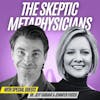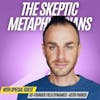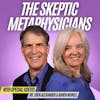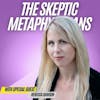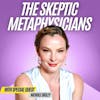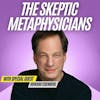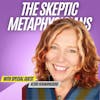Transforming Consciousness from War to Love

In this thought-provoking episode, we dive deep into the transformative journey from a war consciousness to a love consciousness, guided by the insights of Dr. Teri Baydar, a leading voice in the fields of consciousness and personal growth. Dr. Badar’s expertise sheds light on how shifting our mindset can lead to profound personal and societal changes, moving us towards a more connected, peaceful, and fulfilling existence.
Main Themes Discussed:
- The Power of Shifting Consciousness: Learn about the fundamental differences between a war consciousness, marked by division and conflict, and a love consciousness that emphasizes connectivity, impermanence, and complementarity.
- Principles of Love Consciousness: Dr. Badar outlines the core principles of love consciousness and how it can serve as a catalyst for personal and societal improvements. Discover the significance of mindset in influencing our actions and the broader implications for addressing global issues.
- Strategies for Embracing Love Consciousness: Through his book “Flip the Switch” and practical advice, Dr. Badar offers tangible strategies for individuals to cultivate gratitude, personal evolution, and a shift towards a more loving consciousness. Learn how to break free from the “happiness formula” and the “sickness of more” to find true fulfillment through inner growth and self-reflection.
- Success Stories and Self-Improvement Techniques: Be inspired by success stories of individuals who have transformed their lives by setting small goals and employing self-improvement techniques. Understand the process of gradual change and how it can lead to lasting personal transformation.
- A New Model for Capitalism: Explore the concept of transitioning from a traditional pyramidal model of capitalism to a web model that promotes interconnectedness, collaboration, and a community-oriented approach to value creation. Discover how this shift can contribute to a more equitable and sustainable world.
Take a deeper dive into this episode at the blog:
https://www.skepticmetaphysician.com/blog/love-consciousness
Guest Info:
Website: https://www.loveconscioushuman.com
Twitter: https://twitter.com/coach2executive
Instagram: https://www.instagram.com/drteribaydar1
Facebook: https://www.facebook.com/profile.php?id=100018313689175
Support the Show:
Rate/review Us Here: https://lovethepodcast.com/SkepticMetaphysicians
Purchase Merchandise: https://www.skepticmetaphysician.com/store
Buy Me A Coffee: https://www.buymeacoffee.com/SkepticMetaphys
Connect With The Skeptic Metaphysicians:
Website: skepticmetaphysician.com
Facebook: @TheSkepticMetaphysician
IG: SkepticMetaphysician_Podcast
Tik Tok: @skepticmetaphysicians
Other episodes you'll enjoy:
The Cosmic Shift: Exploring Humanity's Ascension Into 5D Consciousness
https://www.skepticmetaphysician.com/5D-Consciousness/
The Urgent Call for Consciousness Shift
https://www.skepticmetaphysician.com/consciousness-shift/
The Sleeping Prophet: Edgar Cayce and His Wondrous A.R.E.
https://www.skepticmetaphysician.com/edgar-cayce/
Will: [00:00:00] Karen. Yes. This is it.
Karen: What is it?
Will: This is it. What's it? This is the moment where everything changes.
Karen: Oh.
Will: Yes. Now we've talked. At great length about the need for more love in the world. Yes. Well, today we have hit the mother load.
Karen: Nice.
Will: Yes. We are talking about how and why to make this from war consciousness to love consciousness.
Karen: Oh, that sounds perfect.
Will: It is right, right up your alley. I knew you'd love this topic. this episode's over, we'll get really good understanding of what exactly is holding humanity back from its full potential. So. How to flip the switch and make the world what we all really want it to be.
And what the relationship between our physical brains, our conscious minds, and our celestial spirit actually is. Plus a whole lot more that you're going to want to stick around for. So don't go anywhere. Cause this episode of the Skeptic Musicians starts now.
[00:01:00]
Will: Hey there. I'm Will and I'm Karen. And today we are honored To be in the company of a groundbreaking thinker and expert in the field of consciousness, personal growth, and the underlying forces that shape our world. That's actually three fields, but who's counting, right?
she's the author of the recently published book, Flip Your Switch, a user's guide to a whole new mind, a guide to understanding ourselves and the world around us. And she's here to help us move from war consciousness into a Love consciousness with our tested process that is sure to create a higher consciousness [00:02:00] in aligned with our individual thinking and purpose.
Welcome to the show, Dr. Terry Badar.
Dr. Baydar: Hello. Thank you
Karen: for having me. I'm very excited to be here. Well, we are thrilled to have you joining us. Yes,
Will: I can promise you no one's more excited to talk about love than Karen is right now. So, so before we get started, cause we got a lot to go into, but let's just set the scene, In your estimation, what exactly is love? Love consciousness. How do we define that?
Dr. Baydar: Love consciousness is the higher consciousness and awareness and understanding of how the universe really works in connectivity, in the impermanence and the complementarity of all things. It's the actual fabric of the universe.
And it is the natural fabric where nothing is gained, nothing is lost and everything is complimentary is [00:03:00] completing the other. Does that make sense?
Will: It does. I think it does. So when you say it completes one thing, completes the other. I think we're gonna have to go a little bit deeper into that because what's the one thing, what's the other?
Dr. Baydar: Okay. So let me start. I actually prefer this conversation. If I can flip over to war consciousness, war consciousness is this mind set that you and I are different. Somebody wins, somebody loses there. Somebody's up, somebody's down, somebody's right. Somebody's wrong. This duality. Okay.
Will: Gotcha.
Dr. Baydar: Love consciousness is when we go beyond the duality and we go into a multi dimensional understanding of how things work.
And that's the mindset of actually you and I are parts of the whole. We compliment one another.
Will: Gotcha.
Dr. Baydar: We work together. One is competition. The other is [00:04:00] complementarity.
Karen: So it's like oil and water or like puzzle pieces.
Dr. Baydar: Yes.
Will: Look at you, Karen, with the perfect imagery for crying
Karen: out loud.
Will: That's awesome. Okay. So basically what I'm hearing you say is the need to win or compete against each other is what we're living in right now. That's war consciousness.
Dr. Baydar: Yes.
Will: Versus love, which is more about let's uplift each other and let's all win together because we are just, there's abundance.
There's no, we're not having to live in what's the term?
Karen: Scarcity.
Will: Thank you. Yes.
Karen: Well, I would even maybe add to that. You're saying competing against one another, but even we compete against ourselves. I did this. Now this one has to be better. Now this has to be better and I've got to be stronger and faster than last time.
And you can never just. Enjoy what you're in,
Will: you know,
Dr. Baydar: correct, correct. Karen. I love it because what I was going to point out was exactly that it's a consciousness. It's not about somebody out there. It's about you in [00:05:00] here, your head, your heart, your cognitive dissonance is your war consciousness. You, me, Every individual on the planet is toggling in and out of this war consciousness and this love consciousness all day long Now some of us are so in war consciousness.
We don't even know that love consciousness exists And that's problematic obviously and then If you're in love consciousness, basically you've elevated to a place where war consciousness is no longer an actual equal to love consciousness. It becomes subordinate. And as it becomes subordinate, it is just, it just becomes polarity or complementarity.
It's no longer anything but, tactical, practical. What do we do next? How do we get there? Do we turn left or right?
Will: So, [00:06:00] obviously, as a whole, I would say probably the whole world, but specifically the United States, because that's where we're sitting in right now, very much in war consciousness, because as you and Karen so eloquently said, we are at odds with ourselves. And in competition with ourselves does. And I kind of know what your answer is going to be, but if we change our war consciousness individually to a love consciousness, do you feel Karen and I change now the whole world is going to change with us, or is there like, there has to be a tipping point, right?
I mean, we have 200 plus years of this country being what it is thinking the way we are, everyone talks about the fact that. Capitalism, right, that the need for more is what has made the country what it is. So how can you, how can we as a country actually adopt love consciousness and yet continue [00:07:00] to prosper in the way we have for the last 200 plus years?
Dr. Baydar: Okay. That's a really great question. So that is a multi level question. So I'm going to try and pick it apart one level at a time in order to answer that. First off, yes. If you shift out of war consciousness into love consciousness as an individual, Your health, your relationships, your business everything you do out in the outside world will improve.
That's kind of obvious because your mind your mind influences your heart, influences your actions, influences your agency in the world, and that all comes back to you. So that's like, if you get rid of that cognitive dissonance and replace it with the love consciousness. Now you were leaning into yes, but if some of us do it, what about the rest of us?
And with that, yes, there is a point of what I call in the book, pure positive critical mass. [00:08:00] Now, we tend to think from this left brain lockdown, again, another one of my terms, That and it's kind of that petty brain bean counter mindset that, oh, in order to have critical mass or shift, we need 51 percent of everybody to do it.
Then we'll ship. That's not actually true. You can have seven or 8 percent of a group do something that influences the rest of the group, especially if it's an upgrade. This is exactly what we're talking about. We're talking about an upgrade. Now. I don't personally know if it's 7 percent or 8%, but I know we don't need 51%.
I'm quite confident on that. So because you want to think about that in terms of consciousness, not in terms of counting beans, when it comes to the consciousness to quote Einstein, for example, no problem was solved at the level of consciousness that it was created. [00:09:00] So basically it's like you can solve your 12 year old's child's problems because you see things from a higher level of awareness.
You know, you have the experience, you have the age, and you have a higher level of awareness. So it's easy. So this is also, What I'm talking about is that when you get certain amount of people that elevate, then they educate others by modeling the model of what it means. And everybody's really actually fundamentally interested in becoming love conscious.
Why? Because the number one low hanging fruit of becoming love conscious is you get to be happy. So it's like, okay, why not? Let's just try. Okay. Now, third part of the question was, you know, you went into the history of capitalism and all the great stuff that humans can do through capitalism, yada, yada.
Well, yes, but then again, it's, [00:10:00] there's a shift in how we're doing business because there's a shift in who we're being. We actually don't need to You know, dump toxic chemicals into the rivers in order to save money so that we can have lots and lots of cheap yoga pants available on Amazon. It's really not needed.
There's so much more that we can do with our brain power, our heart power. And again, it goes back to the thing when you raise your consciousness and if we get enough leaders, which is why I'm a leadership coach, if we can get enough leaders to upgrade their consciousness. What will happen is we start to solve problems differently from a different level.
We don't know how we're going to solve the economic problems or the ecological problems of the planet yet because we haven't reached that critical mass where enough of us at the top are saying, okay, let's [00:11:00] do it somehow different from a different perspective.
Will: So let me just clarify something very important that it's the, it's a dumping of the toxic chemicals in the river.
That's not needed, not the yoga pants, right? Cause yoga pants are very necessary. They're very needed.
Dr. Baydar: Yes. Here we go. I agree. I, I like a hundred percent. We do need yoga pants, but then we get into what you talked about a little earlier. How many yoga pants do you need?
Karen: It's true. We only have so many days in the year and we have laundry.
Will: And there are only so many, yeah, that's a good time not to do it, but okay. You've convinced me. Moving from war consciousness to love consciousness is not only desired, but it is important. We need to move in that direction. And it's like the hundred monkeys where you don't necessarily need everyone to do it.
You just need a hundred monkeys to get, to wash those sweet potatoes. And eventually it'll spread across the entire universe. So that's the idea. Got me. How? [00:12:00] How does someone shift their minds? Like we've been,
Karen: They read her book.
Will: Full disclosure. I read your book. So I happen to know, however, there are thousands of people who are listening to this right now who haven't had the opportunity yet to read your book.
So first and foremost, absolutely go out and get the book, flip the switch. But before they get that, give us a tease. What is one or two ways that someone could actually make a shift in their life right now to move in the direction of love consciousness?
Dr. Baydar: Okay. So I do want to go just shameless two second pitch.
35 years of research starting out in, social engineering and 10 years of boiling it down. So it's not academic, but real and usable for anybody anywhere. It's divided into three parts. Part one is about changing your knowledge of your [00:13:00] mind, how things work. Part two is Developing know how, what are the things you can actually do or try?
And number three is where we bump you up into a state of knowing. that will happen once you've done part one and part two. What I've plugged into in the book is the natural evolution of how a human being. Evolves and part three, we plug into your higher self and that's all along the way. And this is not a method methodology formula style.
What I'm putting out there is try these things and synchronicity will kick in. The universe will show up for you. This is not a formula that's manmade. I'm just showing you. And pointing to all of the little pithy things you need to think about and do so that you can tap into your own synchronicity, your own personal [00:14:00] evolution and find your own higher self.
This is universal. This is the MC squared of how you get there.
Will: And it just snowballs in and out of itself, but it just, it's, once it starts, it gets bigger and bigger. The more you open up to it and all that kind of stuff.
Karen: And that makes sense because once you start appreciating the small, like the little wins and you're focusing on that, you're not focusing on what you want.
You're focusing on, look what already happened and you're starting to feel that abundance you're bringing more in more abundance. It's great. Yes.
Will: And one of the nice things about your book is that it's the, those sections, they're really. digestible. It's not right. It's not like this dissertation that you sit there and you read for freaking three months.
They're bite sized chunks that you can just read in the different sections in very short amount of time and really internalize it really nicely. So thank you. Cause someone like me who doesn't have a really good attention span, it's perfect. It's a perfect perfect book for me.
Dr. Baydar: Yeah, [00:15:00] I took all of the academic pedantic stuff.
I chewed it up like a mama bird, and then I spit it back out in that little book. 52 chapters, 52 weeks of the year. You can do it.
Will: Yep. It's super easy.
We talked about your book and how digestible the sections were and how wonderful the way that you allow it. No, there's no scientific. Jargon and mumbo jumbo. It's very much for the layperson. So first and foremost, thank you for writing a book specifically for me.
Secondly we did touch on the social constructs that are, might possibly holding us back. Can you give us some practical ways that we might be able to break free from some of these social constructs?
Dr. Baydar: It's actually quite simple.
Will: I like simple.
Dr. Baydar: Yeah. All we have to do is really identify them. So a basic social construct there.
I'm going to give you two that are ubiquitous and [00:16:00] destructive that pretty much anybody listening is going to identify with and be like, yeah, I suffer from that. So the first one is your happiness formula. Your happiness formula is a lie. Okay. The happiness formula goes like this. Once I get the right house, the right spouse, I drive the right car, or get the right dress size, or the right hair color, or I get my kids into the right school, or I just redo the kitchen, or I, or this thing, or that thing, or once, once somebody loves me enough to do X, then, then I will be happy.
So the actual structure is a lie. No amount of adding up stuff on one side of the equation will ever equal happiness. That's not how it works. Happiness is a state of being that you choose to cultivate within yourself. So the happiness formula is a lie [00:17:00] and marketing and commerce dig into that construct inside you and they use it at nauseam.
To make you buy stuff that you do not need.
Will: I don't know. I, I like my stuff.
Karen: It makes
Will: my stuff makes me happy
Karen: for a minute. But like when you first get it and you're really happy and then you're like, meh,
Will: but then if you get enough stuff, you're happy. You're a lot. Right? No,
Karen: but you're always wanting more stuff.
Will: But then you get more stuff and then you
Karen: hourglass. It just falls through and it just kills you. Oh,
Will: Karen, you're ruining my social construct here.
Karen: That's the point, isn't it?
Will: Right. Exactly.
Dr. Baydar: the, which also feeds in these two are like the biggest ones that most people will suffer from. And that's the sickness of more, the sickness of more, which was Karen was already leading into it was, yeah, but you got the next thing, the next, there's never enough, but there's not enough.
I have to accumulate stuff. I have to accumulate wealth and like, do we have enough pickles? Like we have to have
Will: enough
Dr. Baydar: more. [00:18:00]
Will: Right? Always. So
Dr. Baydar: all of this sickness of more, this constant grasping, what does that do to us? Well, it keeps us in a state of scarcity and fear and lack and the sickness of more, some people call it poverty consciousness.
I don't like that because it's not a consciousness. It's a construct. And so it just keeps us grasping and grasping for more, which is out there. And it keeps us distracted from what's.
Karen: And that's so funny because people just get so burdened with stuff and then you want to get rid of your stuff because there's just so much stuff.
It's too much stuff. It's like there's stuff here and stuff there and it drives you nuts. You got to get rid of the stuff because you want more stuff.
Will: George Carlin bit, right? Yeah, right. How does a place put your stuff?
Karen: Well, it's like the opposite of laundry, like no matter how much you do the laundry, it's always going to be there.
Will: There's always gonna be more. I don't know. My laundry basket is empty. It's always like, look, it's [00:19:00] gone. That's because you have magic elves. I do. I do. And the elf is called Karen.
Karen: So I just want to get rid of all the clothes and we'll never have more laundry. That's
Will: a, that's a skeptic when positions after dark let's not go down that rabbit hole right now.
Karen: But it is, it's like the opposite. You're trying to get rid of all this stuff and it's piling on. But meanwhile, what you're actually wanting is more stuff, but it's just the other stuff.
Will: The way you say it, it's perfect, right? We've taught, we've heard it before that happiness comes from within, not from without.
And yet we, to us, that's just word. Right. So how do we get cure for the more sickness?
Dr. Baydar: It's not for the faint hearted. As at today, because it is work, it's not just going to come and bite you, you do actually have to do some stuff, not the kind of stuff you buy.
Will: There's the rub. [00:20:00] Okay.
Dr. Baydar: Yeah. You do actually have to work at it.
You have to buy the book. You have to read the book. You have to think about the book. it's like I've done as much as I possibly can. To enable this process. Obviously I challenge my clients. CEOs and heads of HR and executives and all of that. I challenged them every step of the way based on the book and they come to me with questions.
So they have my support and my accountability
Karen: because
Dr. Baydar: they know that they're going to see me in two weeks and if they didn't do anything. They're going to feel funny about it
Will: unless they have a dog, at which point they could say that my dog ate my work. So,
Dr. Baydar: but you do actually have to do that.
And I find that certain individuals have really gotten a lot out of it simply by read a little ponder, try a few things. Read a little, ponder, [00:21:00] try a new, try a few things. There's a cycle that I always give to my clients, which is act, evaluate, learn, adjust. So you do a little bit, you evaluate, what did you learn from it, adjust, and then act again.
So that is actually how we live life. So if you're willing to make a little bit of effort, read chapters that are two pages long, And then think about it. Take it with you. Ask yourself the question. How does that thing show up in my life? How does that construct show up? Where do I see it? If you start to really look at it, you're, you start to be like, Oh my God, this is disgusting.
It's everywhere. How do I get it out? What else is in the book? What did she say in part two? How do I get rid of it?
Karen: Right.
Dr. Baydar: So there is a lot that you can just try and there's no big science about it.
Will: Right. It's important. Two things to note. One is the book is not a novel. [00:22:00] You're not supposed to sit down and read it cover to cover in one sitting, right?
You, like you said, you got to take it in small bites and process it before you move forward to the next one. But second, and probably most importantly, the people that you are talking. To about this kind of stuff. You just said it. There are CEOs of companies. These are people who are in charge of the actual constructs that we are talking about here, right?
The companies that are asking you to buy more and to take more and things like that. So a. I feel encouraged that there are actually our CEOs that are moving in this direction. So woohoo, thank goodness. But B, if CEOs can do this and they're stuck in this social construct of more than anybody can do it, right?
Dr. Baydar: Absolutely. Absolutely. Actually, it's a lot easier for the ordinary person to do it because they don't have to go around and they don't have to turn around and change the company culture after what they just learned.
Karen: Right. And I like that it's those bite sized pieces because when [00:23:00] you think about, gosh, I've got to, stop thinking this way, stop buying stuff.
It's overwhelming just to try to do it all at once. Everyone would fail at that. I like how you've broken it down to like a weekly. Thing that you can look at and digest and put to use.
Will: Did I mention she wrote it for me? All right. So then if that's the case can you give us an example, some examples of some folks that have actually taken these, the words that that they got from your book and made a difference in their life?
Dr. Baydar: All of my clients. Like, what are you looking for? Like because it's endless, whether it's family relationships negotiation styles. Well,
Will: like someone who might have used your, followed your guidance and they changed their lives because of it, like some success stories.
Dr. Baydar: Okay. So I had one client.
He showed up with this war consciousness very simple with this sense of they're out to get me. Somebody's out to get me. There's always somebody out to get me. Right. [00:24:00] And he was Startup 10 years old, 10 year old startup in the uh, medical industry, I'm from Boston. So there's all these like really nerdy things going on, which is wonderful.
And he just had always the sense that it made him angry. It was messing with his relationships. It was messing with how he would negotiate with people. It was messing with all of that. And so we worked together. We. Broke down. Some of the constructs are around that. We looked into his inner narratives because there's also that that's another thing we talk about in the book.
Thoughts are things kind of thing. Like what you think about will come about. How are you thinking? Choose your thoughts wisely. Some very simple, ways of changing the way you show up. What words are you using? All of these self curating methodologies. And over time he was able to feel [00:25:00] good about himself.
And then he was able to discern rather than judge. That's another chapter discernment over judge or over judgment. So instead of judging everybody and being all emotionally attached about what's happening with them and are they like, how are they seeing me? He was able to discern, Oh, actually that person did X, Y, and Z.
They are actually out to get me. But 95 percent of all the other people are not. And these 20 percent over here of the 95 are actually here to help me. And I've been not letting them in. And so he started to let them in and all of his relationships at work at home changed his son with whom he was estranged.
The relationship was healed. His wife was like, Oh my God, please never stop seeing Dr. Terry. Because I just love who you've become. You're just like so nice and so fun to be around now. [00:26:00] So that's what happens naturally. And all we do with the book. Is point out lots of things that you can think about and try so.
And you'll notice that in my success story, I didn't talk about how he went on to make load boatloads of money. It was his inner journey. It was his happiness factor that went sky high. It was his relationships that improved, his negotiation style changed. Well, what do you think that led to, as he was going into an IPO?
Well,
Karen: even, beyond the success that ultimately this would all lead to financially, just that feeling of happiness will cause you to feel more successful, even if the financial part isn't necessarily part of it.
Dr. Baydar: Right. Yeah. And that feeling is the basis for what happens in the outside world.
Will: So we're in a topic of your book. In the book, you explore [00:27:00] the connection or the relationship between our physical brains, our conscious mind, and our celestial spirit. Tell us a little bit about that. How are they related?
Dr. Baydar: Well, I mean, it depends on how
Will: we have been known to go really far, so feel free to go as far as you feel comfortable.
Dr. Baydar: Okay. Well, for starters, just for the listeners. Your brain is the hardware, okay, that, and then your mind is the software. So, we want to know now, the great thing about the human mind, or the mind in general, is that it can shape. the physical. In brain science, we call that neuroplasticity. So if you think certain thoughts, it will create certain peptide pathways that then become ingrained and those become patterns and habits and behaviors.[00:28:00]
So what you think about comes about. In that way, so that is a really important part of the book is understanding your software versus your hardware. Now, obviously, if your hardware is ill, meaning it's all rusted out because you eat bad food and don't sleep, well, you might want to address that too. So one of the chapters is make your body a great place to live.
You do have to take care of the physical as well. It's not just a one. You can't just think your way to the solution or own your way to it. Not going to happen.
Okay. So that's important. Now, when we go into the third part of the book, we introduce the daemon. The daemon is your higher self. It is your connectivity to the greater mind. And that allows. things to happen in my p where I'm not working for [00:29:00] I work a lot with social stay with me for long per who are blazing amazing t Naturally become precog or have these peak experiences because they've gotten rid of so much of the social constructs holding them back.
They've tried and experimented with all the things in the second part of the book. And then they get to the third part of the evolution, which is tapping into your Damon. And I love that term. It's the ancient Greek term for your higher self, which is like, sounds like diamond. And I think that's just wonderful because it's so rich and it's also like, you think of it like a crystal that's bringing down the downloads.
And, cause I have a CEO who dreamt his, the VC funding before it happened and before he [00:30:00] met the VC.
Will: Wow.
Dr. Baydar: So he was just walking into his own movie when he went to the meeting.
Will: That's kind of cool. That's kind of a cool way to put it.
Dr. Baydar: Yeah.
Will: Walk into your own movie. That's pretty awesome. Okay. So then if we all put all of these things into effect, into action, how, what do you foresee for humanity? How is that going to change us as a whole?
Dr. Baydar: We are shifting. I work in business a lot. My next book will be healing the broken business model where I talk a lot about this question.
in the very end of the book, I talk about natural economics. So we have a pyramidal extraction exploitation model of capitalism that has been around for a very long time. It is reaching end of term. It can no longer sustain itself. The, there are too many, There's too much extraction going up at the top and nothing left to extract from at the bottom whether it's planet or people that are that we like to exploit and [00:31:00] squeeze and not pay correctly and not give them health insurance and all that good stuff.
So that pyramidal model is not sustainable. There is a model that's coming about, which is a web model where you have all of these clusters where value is being added. It's constellation fashion. I have clients that are already doing this and that is their business model where we add value in small units communities Different places all over the world, and these communities are interconnected to one another.
Just like you and I, or you two and I are on this podcast, and then the listeners will be listening. We're creating value in these little pods. And it's going all over the [00:32:00] world in these little webs. So if you think of the planet, imagine the earth, and that each of these value pods are these little golden lights.
And if you start to, like a spider, make all of these strings that attach all of these golden little lights, You cover the planet with golden light. That is how economics are going to work as well. We are going to add value first and monetize second.
Will: I'm not sure if I'm following completely. However, There is a model in podcasting currently called value for value, which means that people listening to your show can actually donate certain amount of money to you as a way of giving back the energy exchange or something along those lines. Is that kind of what you're talking about?
Dr. Baydar: A little bit, a little bit. So So in love consciousness, when we move into love [00:33:00] consciousness one plus one starts to equal three because we add value. Like in business, we have synergy where the the outcome is greater than the sum of the parts.
Karen: So the more you love, the
Dr. Baydar: more you can love. But the more you love, the more you create love you, the more you create structures for love, the more you create the ability for other people to love.
In there's a C in war consciousness, one plus one equals zero. It's always duality and it's transactional. You me, you versus me, us versus them. Somebody wins, somebody loses. When we move into a model where it's about comprehending and being complimentary to one another and cooperating with one another, there's added value.
This is synergy. As we employ it [00:34:00] in business, there's added value. You're not siloing things out. That added value is really hard to capture, contain, and control because it's in love consciousness, capture, contain, and control are war conscious. Functions. Within love consciousness, we don't try to capture, contain and control.
We create value. Everything in nature does that. And these economic models are more about creating value and not confusing value. with money. Value is what it's, how you're serving someone. Okay.
Will: Going back to something you said a little bit earlier, where you, what you were facilitating someone else to succeed or have value.
Is it like the whole rising tide raises all ships kind of mentality or And I'm going to edit this out for a second, but Karen, I'm thinking this is like our model for ethereal. We're [00:35:00] building something that are, is we're bringing a lot of other people who are doing what we're doing to the table, providing a platform for them to get their message out to as many people as possible.
So that way we're adding, providing value to the people that are coming on as content collaborators, but they're also adding value to the people who are listening or watching and everyone's learning and growing together. So basically what you're saying is that Karen, we're already in love consciousness and we had no idea.
Karen: Yeah. I'm an art major. So
Dr. Baydar: it's actually quite natural, but yeah, it's actually quite natural. That's how communities work. That's how households work. you know, If you read a book like better capitalism, or If the stock market crashes tomorrow, we're all poor.
Will: Yes, yes, yes, we are. I understand. So a lot of this stuff that you talk about is in the book, but there's so much more to you than just the [00:36:00] book. You have a website. You have actually you have a community with the love conscious community where people can actually join and be part of this love conscious community and you have a consciousness conversations and you have all these kinds of things that come along with it.
Including if I saw it correctly, you are, is there a headspace guided meditation series from you coming sometime in the
Dr. Baydar: future? Something maybe actually yes, I have love conscious human. com and we're moving away from the. Membership model, and we're moving into giving it away. Ah, so that's our next.
We're migrating into I'm giving it away. So we were going to be giving away audios of cultivating joy sessions that we had with other [00:37:00] people and all that they brought. To the thing. I'm going to be putting out love conscious human podcast where I'm interviewing executives about how this love conscious thing actually serves them.
Then I'm going to be creating flip your switch guide podcast, which is where readers Like you will can come and ask me any question about a chapter and we can talk about that chapter. We record it for anybody who's also reading the book, that becomes a support because you're gonna ask the kind of questions that somebody else might ask, right about, well, what do I need to know here about this particular chapter?
And that becomes a support system for anybody reading the book. I'm really trying hard to give it away.
Will: Wow. It's not typical that you hear that, that people are giving it away. But based on your map and your model, the value model, then the more you give away, the more that the universe will give [00:38:00] back to you.
That's like what you're talking about here. Makes perfect sense. Now I totally get it now.
Karen: So,
Will: all right. If someone wanted to learn more about you or love conscious or even purchase the book, Flip the Switch, what's the best place for them to start?
Dr. Baydar: Flip your switch. A user's guide to a whole new mind is on Amazon.
It's on Barnes and Noble and pretty much anywhere you would buy a book online first, then you can find me as a leadership coach, I'm on white lily coaching. com, which is white lily, like the flower. My other website, love conscious human. com is where I'm trying to give it all away. And I also have a YouTube and I'm on a, so doc, and then I have a, so that's love conscious human YouTube.
I have white lily YouTube as well. Leadership. I have Dr. Terry made our one on [00:39:00] Instagram where I follow you guys like crazy.
Will: I know. And I thank you for that.
Dr. Baydar: I love your stuff. And that's pretty much it. I mean, you can find me on Facebook. I'm not very active on Facebook. I guess that's most of it.
Oh, and LinkedIn, Dr. Terry Bader.
Will: Okay. Well, we're going to add direct links to all that, all the stuff you just, we're going to add direct links to our show notes. So, you can go to a skeptic, metaphysician. com, go to her episode page, you'll see all the links laid in there directly if you need to. Get in touch with Dr.
Terry. You'll have everything you need right at your fingertips. So Dr. Terry, thank you so much. This has been super eyeopening and I'm going to, I know, have to fight Karen for my copy of Flip the Switch. We really appreciate you coming on, sharing your expertise with us. And hopefully we'll see you on your podcast when you're answering all my questions.
Cause I'm going to have, I have a lot of them
Karen: for you. And hopefully lots of switches will be flipping.
Will: Yes. Here to here, here, right from your, your mouth to God's ear.
Karen: All
Will: right. Dr. Terry, thanks so much for coming on.
Dr. Baydar: Thank [00:40:00] you.
Will: And a huge thank you to you. We know that there are tons of options out there and having you decide to come along on our journey of discovery with us is an absolute honor for us. We hope you've enjoyed this conversation as much as we have. If you did and you feel called to give back, we invite you to visit our website at SkepticMetaphysician.
com where you can donate to the show or subscribe as a member through our Buy Me a Coffee campaign. Your support will go a long way towards allowing Karen and I to bring you these wonderful conversations and teachings in more and more robust ways. Well, that's all for now, but we'll see you on the next episode of The Skeptic Metaphysician. Until then, take care.
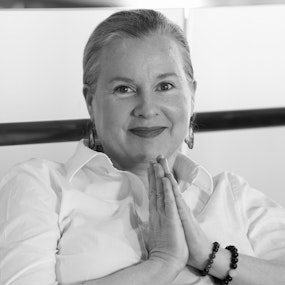
Dr. Teri
Baydar
Dr. Teri Baydar is a renowned leadership coach and CEO Whisperer. She earned her MBA from Hult International Business School with accrued training in authentic leadership, managing complexities, and behavioral economics. Between writing, coaching, and teaching meditation, Dr. Teri devotes herself to Love Conscious Human, a one-of-a-kind educational platform for evolving humans. Love Con- scious Human was created to support those ready to embody Love Consciousness and participate in crowdsourcing a better future.
















